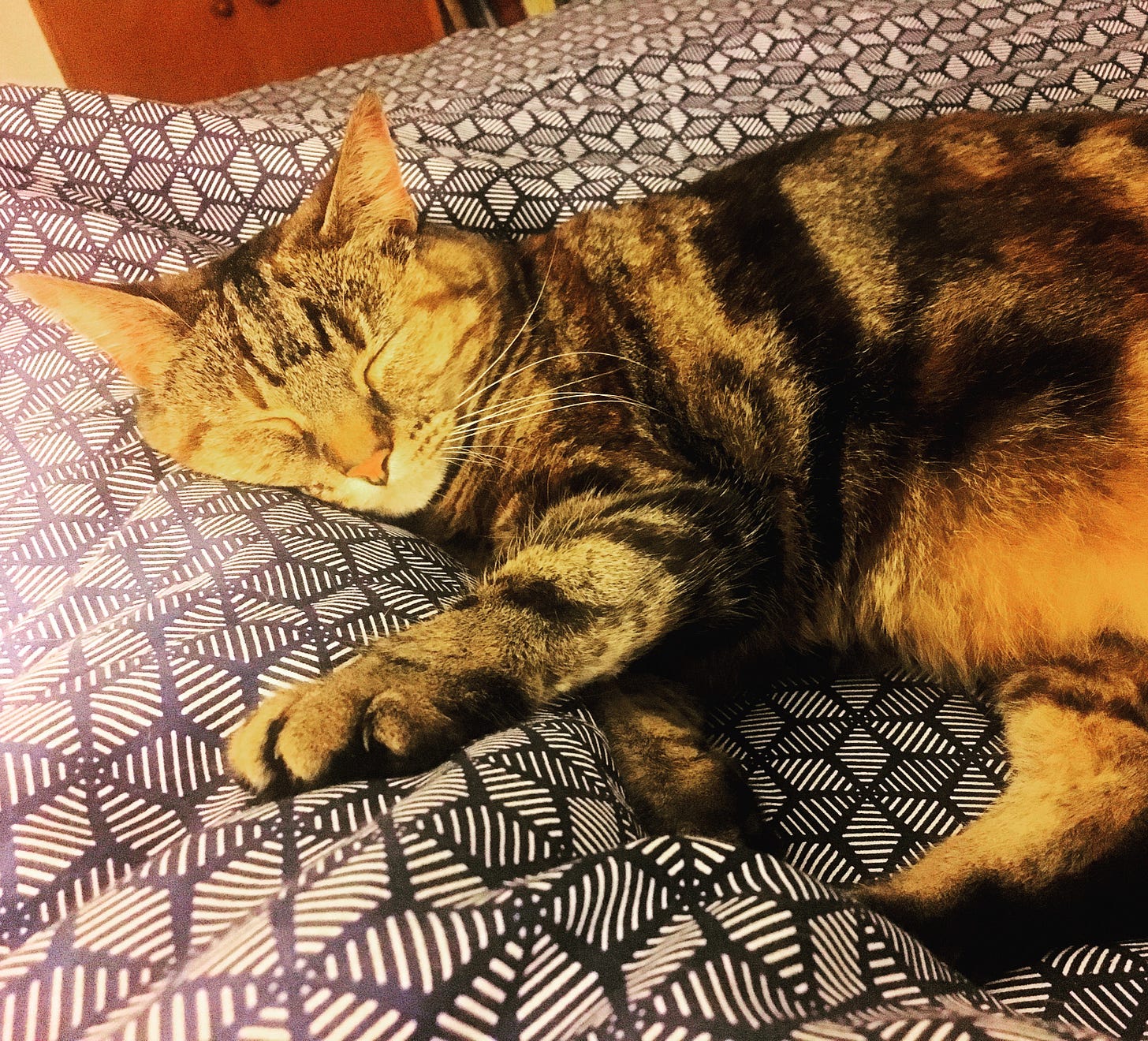Gestapo ghosts
A tale from Occitan country
For two days now I have been involved in a long and angry fight with Air BNB. I won’t bore you with it, although it has left me angry: the kind of anger you feel as a child when something happens that you know is unfair and yet you can do nothing about it. I am stamping my feet right now, to no avail because Air BNB has found against me though no court would have. If you’re very interested, I just tweeted a long thread about it which will probably get me turfed off Air BNB.
So instead of that, I’m going to tell a story of a house.
I own a house in south-west France. When I was about to do the writing part of The Big Necessity, and because at the time I had neither boyfriend nor cat, I asked my friends if anyone had somewhere quiet I could rent for six months. Head down, write. My friend Julie suggested her friend Cath, who, Julie said, “owns a whole bloody street in a French village.” This was not untrue: Cath and her husband Shaun owned three houses in a tiny village in south-west France, in the foothills of the Pyrenées, on the way to Andorra from Carcassonne. I rented their middle house for six months and was both productive and happy. I borrowed Cath’s two gorgeous lurchers Molly and Maggie twice a day and we marched up and down hills and through forests. I loved the village, and when I heard from a neighbour there that a relative of hers was selling a house and cheaply, I was interested. I was living in London, renting, and I could not afford anything there. I went to see the house and it was, well, interesting.
There used to be two cafes in the village. Cathy lived in one; this was the other. It used to be called the Cheval Blanc, but my friend Bernard told me that actually it was given the Occitan nickname of Remua Salsa (I think: all Occitan speakers please correct me if that’s wrong). It meant “Burnt Sauce.”
It had also served as a small hotel, apparently for travelling salesmen and merchants. The rooms still had numbers on, and although there were five bedrooms, there was only one toilet, next to the garage.
The house was a state. It was three hundred years old, probably, judging from the breadth of the walls, and the décor had been left in peace for sixty years or so. The floors were covered with hideous lino, it needed rewiring, new plumbing, everything.
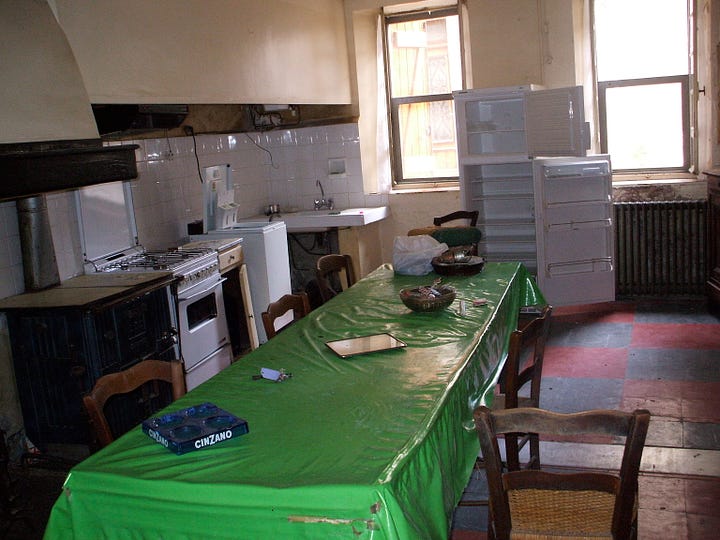
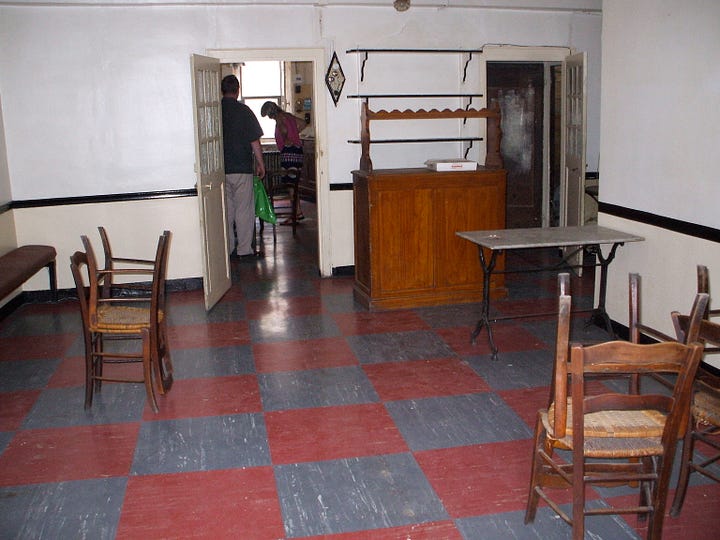

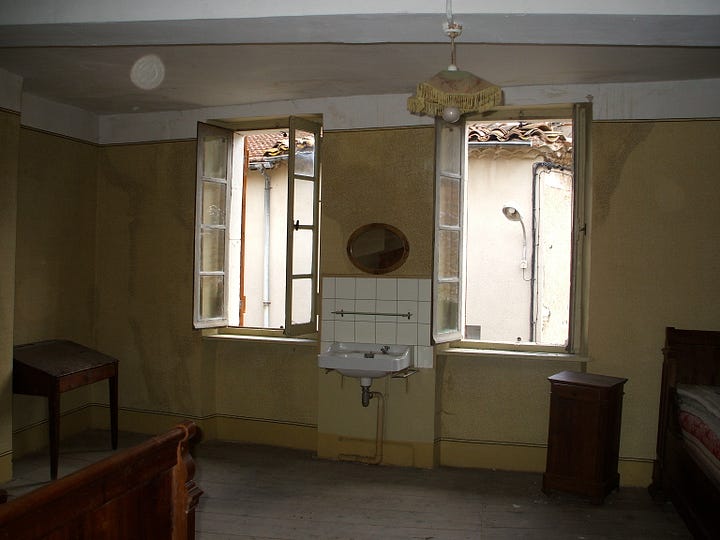
Really, I should have run a mile from it. But then the village said it was going to compulsorily purchase it, and my hackles rose. After six months, the mayor changed his mind, and by that time I was committed.
Fifteen years later, the house has had new floors, pretty much a new roof, total rewiring, a new kitchen, new boiler, two new toilets, including a Japanese TOTO toilet which I will tell you about another time. It looks quite different now.
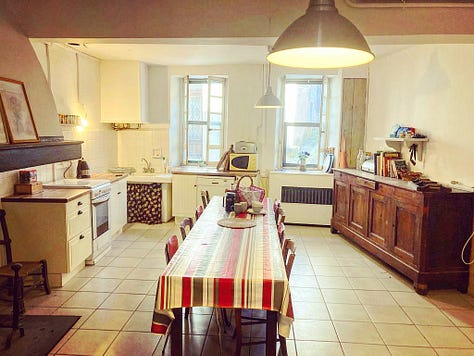
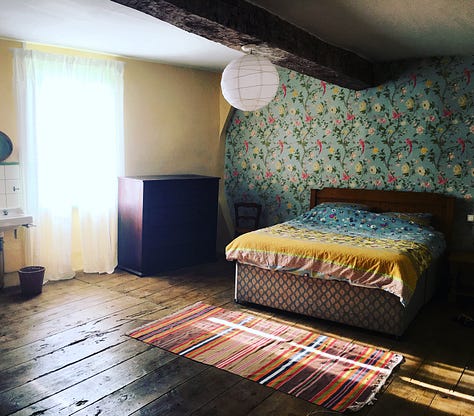
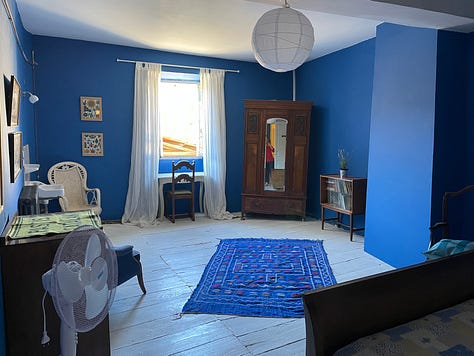
Last weekend, I flew down with my partner to prepare the house for Air BNB guests. One day, my partner was vacuuming in room 6 – our bedroom on the top floor – when he felt someone tap his elbow. I was out somewhere but he thought I’d come back early. He switched off the vacuum and turned to speak to me.
There was no-one there.
Now, it’s a big old house. It is a little spooky if you’re on your own. But I’ve never felt anything sinister.
That room though has history. Because during the Second World War, the two cafés in the village took different sides. Cath’s café was the café of the Maquis, as the local resistance were called. Mine was the Vichy café, patronised by sympathisers for the collaborationist Vichy regime. Even now people still remember which houses and families were on which side.
There are many war stories still told, including the Maquis schoolmaster who worked in the building adjoining mine. Someone denounced him to the Nazis (who had set up an HQ in the town 5K away, in a beautiful castle), and he fled by escaping through the rooftops. Or over the roofs, depending on who is telling the story.
This is my war story. Early on, when I’d just bought the house, I invited my neighbour Yvette to visit. She was in her late seventies by then, and lived opposite the back entrance – the hotel entrance on what used to be the main village street -- in a huge house that had a dairy attached. We were standing in room 6, what is now our bedroom, and she told me a story. During the war, there was a labour camp set up at the village train station about a kilometre out of the village. It housed people the Nazis considered undesirable, and some were later deported to concentration camps. The prisoners were allowed a daily ration of milk and would come to the dairy to fetch it. Sick prisoners though did not come, and so some kindly prisoners tried to get an extra ration for them, and Yvette’s family obliged.
Yvette’s family was denounced, probably by the family who lived in my house. And so my bedroom, the room with the elbow-tapping ghost, became a Gestapo spy station. A Gestapo team came from the nearby town, set themselves up in the bedroom and spied on the dairy. I don’t know what happened to Yvette’s family or if they were punished. But the thought of the presence of long-dead Gestapo officers in my bedroom disturbs me more than a ghost who simply wanted to tell my partner that he’d missed a bit.
Book review
I share a publisher – Granta – with the youngest Booker prize-winner, Eleanor Catton. If I ask nicely, my lovely publishers send me book care packages, and the latest contained Eleanor Catton’s latest, Birnam Wood. I got into trouble with my then editor at the time for tweeting my disbelief that The Luminaries, Eleanor Catton’s second book, had won the Booker prize. So I will be careful with my words now. Catton is definitely extremely talented. But as I finished the book last night and put it down with disappointment rather than regret, I will only say that I’ve read many rave reviews of it and I think we must have read different books. Good title though.
--
Animal hero of the week
My cat, Dora. I got her as a rescue, along with her mother, nine years ago. I went to a foster home in Leeds that had a conservatory full of cats. A kitten torpedoed across the room, jumped up at me and started licking my neck.
I’ll have this one, I said.
Just as I was leaving, the foster carer pointed to another cat sitting serenely on the windowsill. That’s her mother.
And, stupidly, I said I’d take her too. Stupidly, because I quickly learned that after the kitten is six months or so, the mother wants nothing to do with her. Occasionally they would sleep side by side, but mostly whenever the kitten – now called Dora – would pass her, her mum would hiss and try to thump her.
Six months later, Dora’s mum was hit by a car that didn’t stop.
Dora didn’t seem bothered. And since then, Dora has become my support animal through some very difficult years. Until I became more stable by getting my medication more right than it had been, I had plenty of bad days. On those days, I had to flee to a dark bedroom and lie in bed. And without fail, Dora would come to join me and curl up next to me and that was the kindest thing she could have done. I will never agree with people who say cats are snooty and selfish. Mine is not. Except at 4 in the morning when she’s biting my ear and doing a very good impression of Simon’s Cat.
Dora is a mongrel mackerel tabby cat who has not been under fire or detected landmines or carried messages from behind enemy lines. But she would if I asked and she is a hero to me.
P.S. Rent my house!



